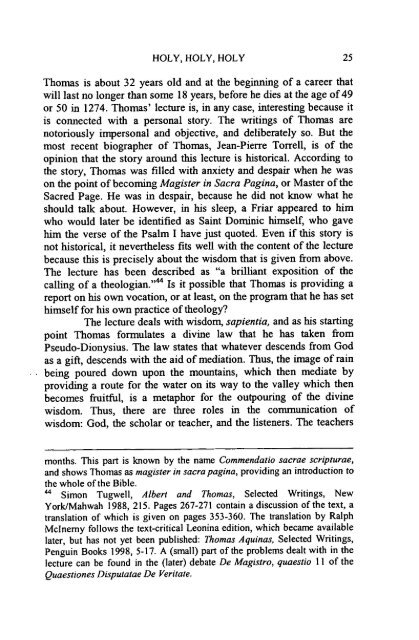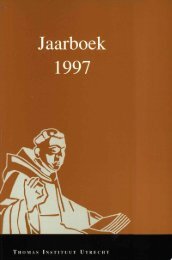Jaarboek Thomas Instituut 2006 - Thomas Instituut te Utrecht
Jaarboek Thomas Instituut 2006 - Thomas Instituut te Utrecht
Jaarboek Thomas Instituut 2006 - Thomas Instituut te Utrecht
You also want an ePaper? Increase the reach of your titles
YUMPU automatically turns print PDFs into web optimized ePapers that Google loves.
HOLY, HOLY, HOLY 25<br />
<strong>Thomas</strong> is about 32 years old and at the beginning of a career that<br />
will last no longer than some 18 years, before he dies at the age of 49<br />
or 50 in 1274. <strong>Thomas</strong>' lecture is, in any case, in<strong>te</strong>resting because it<br />
is connec<strong>te</strong>d with a personal story. The writings of <strong>Thomas</strong> are<br />
notoriously impersonal and objective, and delibera<strong>te</strong>ly so. But the<br />
most recent biographer of <strong>Thomas</strong>, Jean-Pierre Torrell, is of the<br />
opinion that the story around this lecture is historical. According to<br />
the story, <strong>Thomas</strong> was filled with anxiety and despair when he was<br />
on the point of becoming Magis<strong>te</strong>r in Sacra Pagina, or Mas<strong>te</strong>r of the<br />
Sacred Page. He was in despair, because he did not know what he<br />
should talk about. However, in his sleep, a Friar appeared to him<br />
who would la<strong>te</strong>r be identified as Saint Dominic himself, who gave<br />
him the verse of the Psalm I have just quo<strong>te</strong>d. Even if this story is<br />
not historical, it nevertheless fits well with the con<strong>te</strong>nt of the lecture<br />
because this is precisely about the wisdom that is given from above.<br />
The lecture has been described as "a brilliant exposition of the<br />
calling of a theologian.T" Is it possible that <strong>Thomas</strong> is providing a<br />
report on his own vocation, or at least, on the program that he has set<br />
himself for his own practice of theology?<br />
The lecture deals with wisdom, sapientia, and as his starting<br />
point <strong>Thomas</strong> formula<strong>te</strong>s a divine law that he has taken from<br />
Pseudo-Dionysius. The law sta<strong>te</strong>s that wha<strong>te</strong>ver descends from God<br />
as a gift, descends with the aid of mediation. Thus, the image of rain<br />
being poured down upon the mountains, which then media<strong>te</strong> by<br />
providing a rou<strong>te</strong> for the wa<strong>te</strong>r on its way to the valley which then<br />
becomes fruitful, is a metaphor for the outpouring of the divine<br />
wisdom. Thus, there are three roles in the communication of<br />
wisdom: God, the scholar or <strong>te</strong>acher, and the lis<strong>te</strong>ners. The <strong>te</strong>achers<br />
months. This part is known by the name Commendatio sacrae scripturae,<br />
and shows <strong>Thomas</strong> as magis<strong>te</strong>r in sacra pagina, providing an introduction to<br />
the whole of the Bible.<br />
44 Simon Tugwell, Albert and <strong>Thomas</strong>, Selec<strong>te</strong>d Writings, New<br />
YorklMahwah 1988,215. Pages 267-271 contain a discussion of the <strong>te</strong>xt, a<br />
translation of which is given on pages 353-360. The translation by Ralph<br />
McInerny follows the <strong>te</strong>xt-critical Leonina edition, which became available<br />
la<strong>te</strong>r, but has not yet been published: <strong>Thomas</strong> Aquinas. Selec<strong>te</strong>d Writings,<br />
Penguin Books 1998, 5-17. A (small) part of the problems dealt with in the<br />
lecture can be found in the (la<strong>te</strong>r) deba<strong>te</strong> De Magistro, quaestio 11 of the<br />
Quaestiones Disputatae De Verita<strong>te</strong>.








